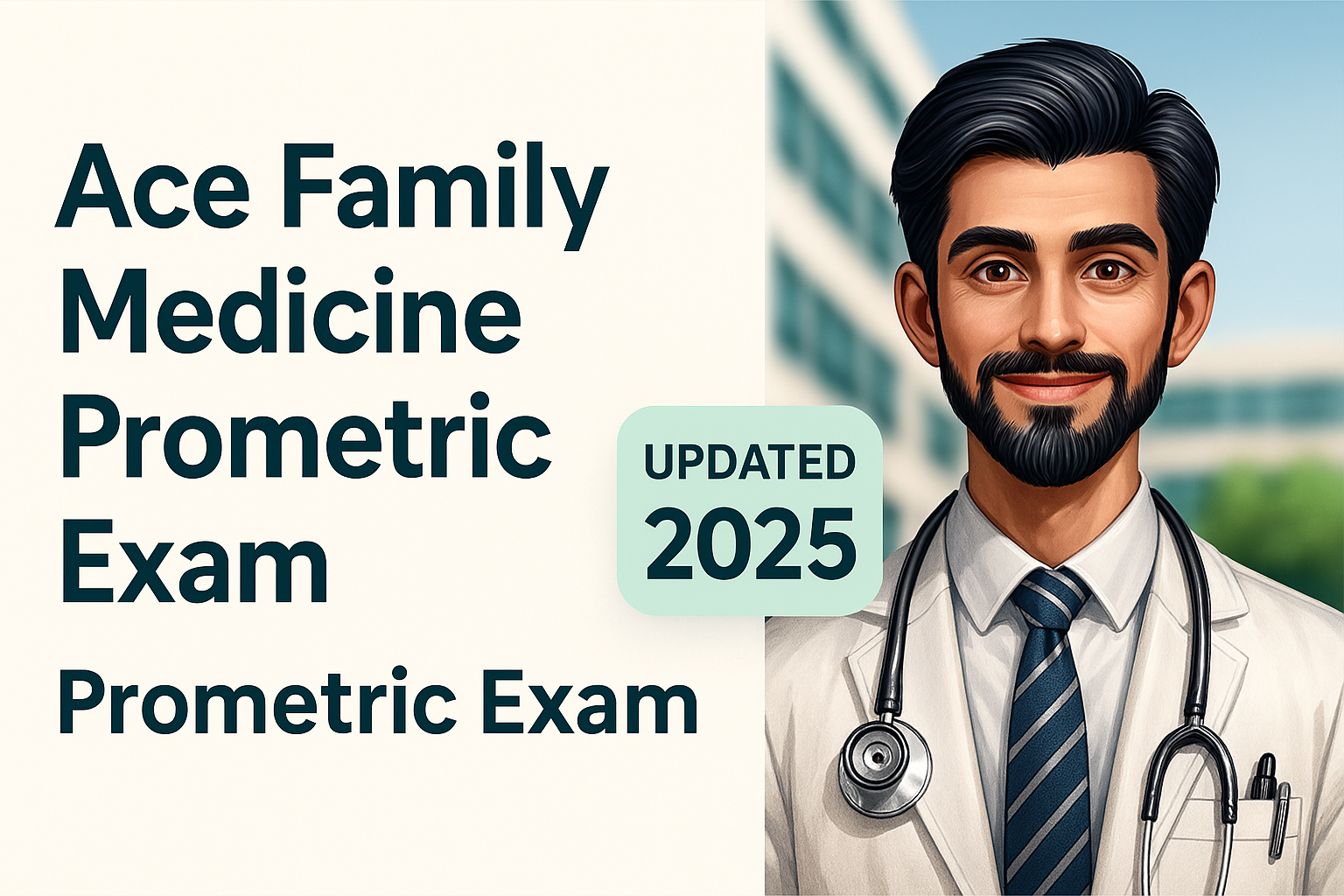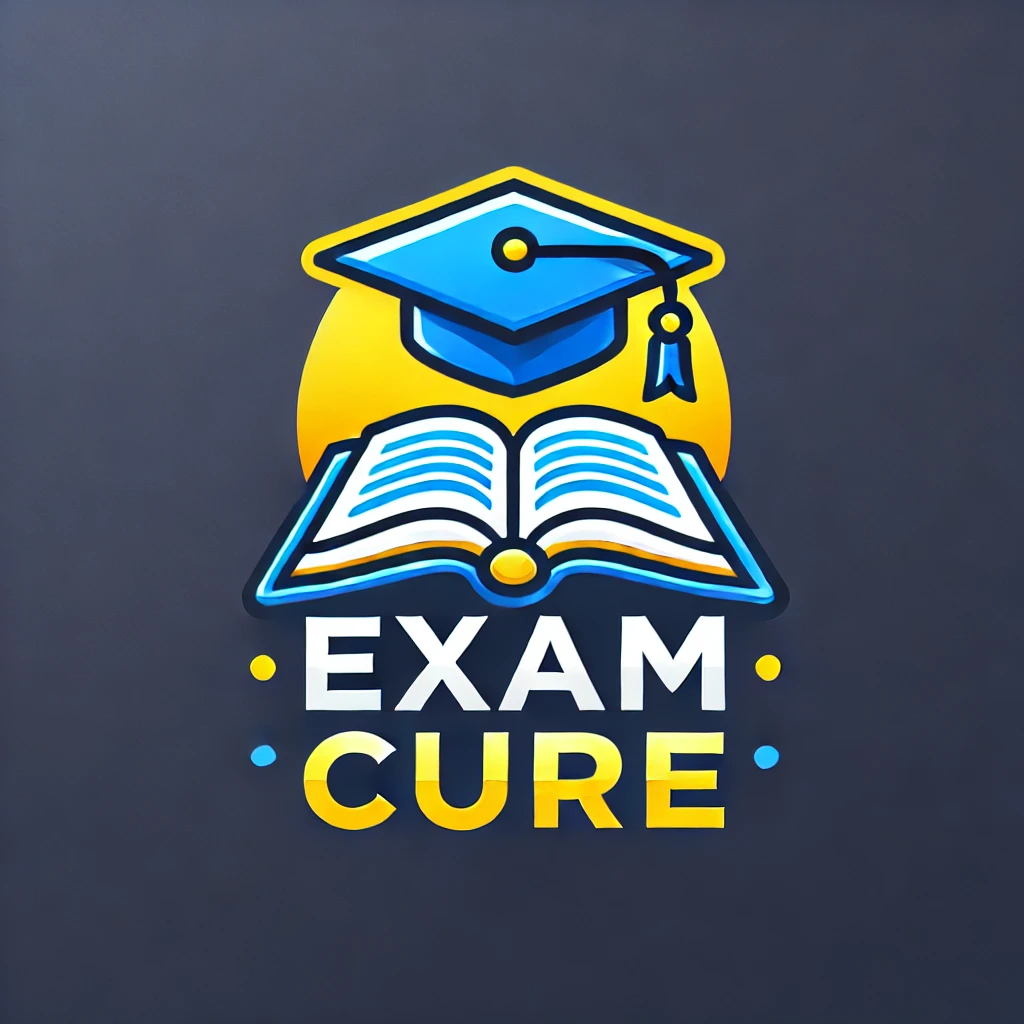Family Medicine Exam Prep-Part 1-MCQs Bank
Ready to pass your Family Medicine Prometric Exam?
Prepare with ExamCure’s specialized QBank featuring 3000+ high-yield Family Medicine MCQs, carefully crafted for DHA, MOH, DOH, QCHP, KMLE, and NHRA exams.
Our question bank is fully aligned with official blueprints to help you focus on what matters most — clinical reasoning, exam-relevant content, and real-world scenarios.
Master the best-of-five format, reinforce your clinical knowledge, and improve your exam readiness.
What You’ll Get:
✅ 4000+ Family Medicine MCQs covering all core topics
✅ Detailed Explanations for correct and incorrect options
✅ Mapped to 2025 Exam Blueprints (DHA, MOH, DOH, QCHP, KMLE, NHRA)
✅ Regular Updates to match current clinical guidelines and exam trends
✅ Designed by Board-Certified Family Physicians
Your path to passing the Family Medicine Prometric Exam starts here.

Course contents
Family Medicine Prometric Exam Overview | DHA, MOH, DOH, QCHP, KMLE, NHRA
How many hours is the Family Medicine Exam?
How many questions is the Family Medicine Exam?
What topics are covered on the Family Medicine prometric Exam?
Family Medicine Prometric Exam Topics Covered:
- Dermatology
- Gastroenterology
- Neurology
- Haematology
- Cardiovascular Disease
- Psychiatry
- Respiratory
- Nephrology
- Endocrinology / Metabolism
- Reproductive-Female
- Population-Based Care
- Musculoskeletal
- Reproductive - Male
- Reproductive-Female B
- Patient Based Systemsi
More About the Family Medicine Prometric Exams | DHA, MOH, DOH, QCHP, KMLE, NHRA
Success in the Family Medicine Prometric Exams requires more than memorization — it demands a focused, strategic approach aligned with the official blueprint.
Here are expert insights and tips to help you maximize your score:
Key Exam Insights for Family Medicine Prometric Exam Blueprint
📝 Exam Format:
• 150 MCQs
• Duration: 3 hours
• Type: Single-best-answer questions
Core Subject Focus Areas
- Family
Medicine
• Focus: Chronic disease management, preventive care, patient counseling, lifestyle medicine, screening guidelines.
• Tips:
◦ Master public health, screening protocols, and immunization schedules.
◦ Strengthen your grasp on ethical dilemmas, communication skills, and holistic care. - Internal
Medicine (Relevant to Primary Care)
• Focus: Management of diabetes, hypertension, heart disease, asthma, and thyroid disorders.
• Tips:
◦ Understand diagnostic algorithms and current treatment guidelines.
◦ Prioritize evidence-based medicine and drug interactions in chronic conditions. - Pediatrics
in Family Medicine
• Focus: Well-child visits, developmental milestones, vaccinations, nutrition.
• Tips:
◦ Review the childhood immunization schedule and red flag signs.
◦ Know how to handle common outpatient pediatric concerns. - Women’s
Health (Primary Obstetrics & Gynecology)
• Focus: Prenatal care, contraception, menstrual disorders, menopause.
• Tips:
◦ Study antenatal visits, screening in pregnancy, and common OBGYN issues seen in family clinics.
◦ Be confident in choosing safe contraceptive methods based on patient profiles. - Mental
Health in Primary Care
• Focus: Depression, anxiety, substance use, and basic psychiatric screening.
• Tips:
◦ Learn initial assessments and safe prescribing for SSRIs and anxiolytics.
◦ Know the referral criteria and crisis management. - Emergency
and Acute Care in Family Practice
• Focus: Acute presentations like chest pain, asthma exacerbation, minor trauma, infections.
• Tips:
◦ Be familiar with urgent care triage and when to escalate.
◦ Know basic emergency protocols used in rural and outpatient settings. - Dermatology
in Family Medicine
• Focus: Skin infections, eczema, psoriasis, acne, and suspicious lesions.
• Tips:
◦ Recognize when to biopsy or refer.
◦ Study treatment options and patient education techniques. - Musculoskeletal
Disorders
• Focus: Back pain, osteoarthritis, sports injuries, and common fractures.
• Tips:
◦ Understand physical exam techniques.
◦ Learn when imaging or physiotherapy is appropriate. - Elderly
Care (Geriatrics)
• Focus: Polypharmacy, dementia, falls, end-of-life care.
• Tips:
◦ Know how to do medication reviews.
◦ Study functional assessment and caregiver counseling. - ENT,
Ophthalmology, Urology & Other Common Systems
• Focus: Routine issues like otitis media, sinusitis, urinary tract infections, and conjunctivitis.
• Tips:
◦ Review red flags in ENT and eye symptoms.
◦ Know first-line treatments in outpatient settings.
General Study Strategies for Family Medicine Prometric Exams
✅ Focus on the Blueprint:
Prioritize high-weight areas like chronic disease management, women’s health, and emergency care.
✅ Use Trusted Family Medicine Resources:
Refer to standard textbooks like Swanson’s Family Medicine Review, John Murtagh’s General Practice, and USPSTF preventive guidelines.
✅ Practice Topic-Based MCQs:
Break your revision into themes (e.g., HTN, asthma, pregnancy) and test yourself frequently.
✅ Master Communication, Ethics & Public Health:
These areas are often underestimated but score highly in real exams.
✅ Simulate Exam Conditions:
Solve timed MCQs under pressure to improve pacing and endurance.
Important Reminder
While each licensing authority (DHA, MOH, DOH, QCHP, KMLE, NHRA) may have slight variations in format or focus, the core blueprint for Family Medicine exams remains highly aligned.
Study with updated, blueprint-mapped resources to ensure comprehensive readiness for 2025 and beyond.

